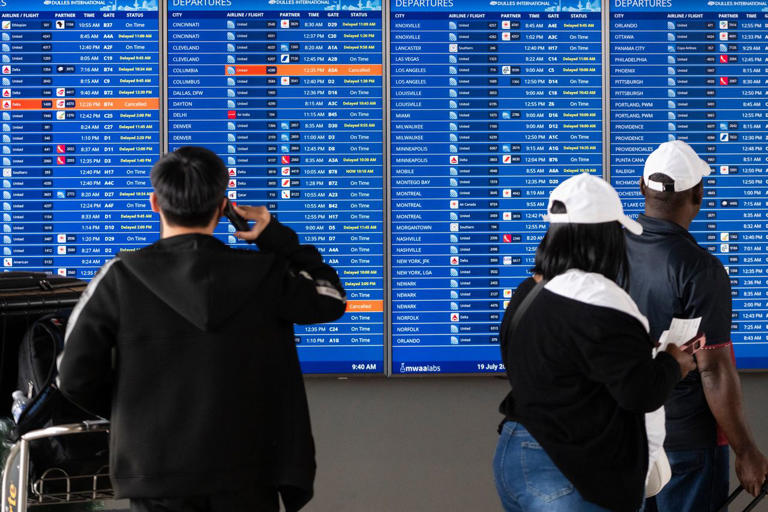On Friday, U.S. stock markets experienced a decline triggered by a major global technology outage that caused widespread disruptions. The outage, which affected critical infrastructure and services worldwide, led to significant declines in major stock indices. The technology-heavy Nasdaq Composite fell by 0.8%, extending its weekly decline to 3.6%. The S&P 500 decreased by 0.7%, while the Dow Jones Industrial Average lost 377.49 points, or 0.9%. Despite the overall downward trend, the Dow managed to record a modest weekly gain, showing relative resilience compared to its counterparts.
Technology Outage Causes Widespread Disruption
The root of the market disturbance was a significant outage linked to CrowdStrike, a leading cybersecurity firm specializing in malware and virus protection. The disruption primarily affected Microsoft Windows devices, leading to operational halts for a range of businesses including banks, media companies, and emergency services. The airline industry was particularly impacted, with many flights grounded as a result of the outage.
CrowdStrike’s stock was hit hardest by the incident, plummeting 11% in a single day and becoming the worst performer in the S&P 500. The company’s CEO later confirmed that a fix had been implemented, but the immediate impact on investor sentiment was severe. Microsoft also saw its shares drop by 0.7% due to the outage’s effects on its systems and services.
Conversely, the outage benefited CrowdStrike’s competitors, as investors shifted their focus to alternative cybersecurity solutions. SentinelOne saw a notable increase of 7.9% in its stock price, while Palo Alto Networks gained 2.2%. These movements reflect a market trend where investors seek stability in companies not affected by the outage.
Market Trends and Investor Sentiment
The technology outage occurred at a time when U.S. stock markets were already in a state of flux. Investors have been rotating their investments away from large-cap technology stocks and into sectors perceived as benefiting from potential rate cuts. This trend was evident in the performance of the small-cap Russell 2000 index, which rose 1.7% for the week, outperforming the major indices.
Callie Cox, chief market strategist at Ritholtz Wealth Management, observed that the market is witnessing an “everything else but tech rally.” With inflation data showing signs of cooling and a robust U.S. economy, there is growing speculation that the Federal Reserve might lower interest rates. Cox suggested that if these conditions persist, the rally in sectors outside technology could continue to gain momentum.
Investor Preparedness and Market Volatility
Despite the optimism surrounding certain sectors, there is significant concern about increased market volatility. Uncertainty surrounding the upcoming November presidential election and the Federal Reserve’s monetary policy decisions are contributing to a cautious investment climate.
Robert Schein, chief investment officer at Blanke Schein Wealth Management, has positioned his clients’ portfolios to mitigate potential risks. By increasing allocations to cash and Treasurys, Schein is preparing for possible market turbulence in the latter half of the year. This strategy reflects broader investor concerns about potential volatility and economic uncertainties.
Treasury Yields and Cryptocurrency Movements
In bond markets, benchmark 10-year Treasury yields rose to 4.238%, up from 4.188% the previous day. This increase suggests a slight rise in borrowing costs and reflects investor sentiment regarding government debt and interest rate expectations.
The cryptocurrency market saw a significant uptick in Bitcoin, which surged nearly 6% to reach $67,235.34. This rise highlights the growing interest in alternative assets amid broader market uncertainties and disruptions in traditional financial systems.
Corporate Earnings and Global Market Trends
In corporate news, several companies reported mixed financial results, contributing to the overall market volatility. Travelers Companies’ stock fell by 7.8% following a disappointing revenue report. Similarly, American Express experienced a 2.7% decline in its stock price due to revenue figures that fell short of analyst expectations. On the other hand, Starbucks saw a 6.9% increase in its stock price after news that activist investor Elliott Investment Management had acquired a substantial stake in the company. This development suggests a potential shift in strategic direction or corporate governance at Starbucks.
Global markets mirrored the declines seen in the U.S., with the Stoxx Europe 600 index dropping 0.8% and Hong Kong’s benchmark index falling more than 2%. These movements underscore the widespread impact of the technology outage and the ongoing global economic uncertainties.
